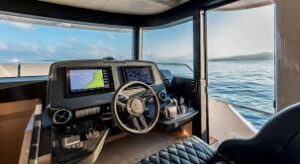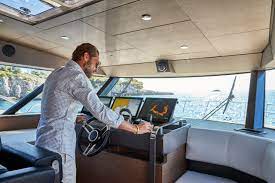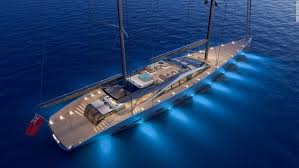The yacht industry has always been at the forefront of innovation and technological advancements. From the early days of sailboats to modern luxury yachts, the evolution of yacht technologies has been driven by the pursuit of comfort, efficiency, and sustainability. In this article, we will discuss the latest advancements in yacht technologies, such as electric propulsion, energy-efficient systems, and new navigation tools.
Electric Propulsion
Electric propulsion is one of the most significant technological advancements in the yacht industry. Electric propulsion systems are environmentally friendly and efficient, making them a popular choice for many yacht owners. Electric motors are powered by batteries, which eliminate the need for diesel engines, resulting in zero-emissions and a quieter ride. This is a significant advantage for yachts that sail in sensitive areas such as marine reserves or nature reserves.
Electric propulsion systems are also more efficient than traditional diesel engines. They offer more torque at low speeds, which makes them ideal for slow cruising and docking maneuvers. The regenerative braking system can recharge the batteries while sailing, making them more energy-efficient. The reduction in noise and vibrations also makes the ride more comfortable, with less disturbance to marine life.
Energy-Efficient Systems
Energy-efficient systems are another technological advancement that is gaining popularity in the yacht industry. The advancements in battery technology have led to the development of more energy-efficient systems, making it possible to power yachts using renewable energy sources such as solar, wind, and hydropower. These systems are ideal for long-range cruising and reduce the reliance on fossil fuels.
One of the most significant advantages of energy-efficient systems is their ability to reduce the carbon footprint of yachts. Traditional diesel engines emit pollutants and greenhouse gasses that are harmful to the environment. Energy-efficient systems eliminate these emissions, making them an environmentally friendly choice for yacht owners.
New Navigation Tools
New navigation tools are also transforming the yacht industry. The development of new technologies such as GPS, radar, and sonar has made navigation safer and more efficient. These tools provide real-time information on the yacht’s position, course, and speed, making it easier to navigate in all conditions.
One of the most significant advancements in navigation tools is the development of autonomous navigation systems. These systems use artificial intelligence to analyze the environment and make real-time decisions on the yacht’s course and speed. Autonomous navigation systems are ideal for long-range cruising, where the yacht may encounter different weather conditions and marine environments.
Autonomous navigation systems also enhance safety by reducing the risk of collisions with other vessels or obstacles. The system’s real-time analysis of the environment and its ability to adjust the yacht’s course and speed based on this analysis ensure that the yacht remains on course and avoids any potential hazards.
In addition to electric propulsion, energy-efficient systems, and new navigation tools, there are other notable advancements in yacht technology that are worth mentioning. For example, the use of lightweight materials such as carbon fiber and aluminum has made yachts more agile and fuel-efficient. The development of advanced communication systems, including satellite and Wi-Fi connectivity, has made it easier for yacht owners to stay connected with the rest of the world.

Another technological advancement that is gaining traction in the yacht industry is the use of virtual and augmented reality. These technologies allow yacht owners to experience a more immersive and interactive sailing experience. Virtual reality headsets can provide a 360-degree view of the yacht’s surroundings, allowing yacht owners to explore new destinations before they even set sail. On the other hand, we can enhance “augmented reality” by providing real-time data on the yacht’s surroundings, such as wind speed, water depth, and marine traffic.
While these technologies are still relatively new, they offer exciting possibilities for the future of yachting. As the demand for sustainable and environmentally friendly yachts continues to grow, we can expect to see more innovations in electric propulsion, energy-efficient systems, and renewable energy sources. Advancements in navigation tools, lightweight materials, and communication systems will also continue to enhance the yachting experience.
It’s worth noting that while these technological advancements offer many benefits, they also come with their own set of challenges. For example, the cost of upgrading to an electric propulsion system or installing energy-efficient systems can be quite significant. The development of autonomous navigation systems also raises important questions about safety and control. Yacht owners and manufacturers must navigate these challenges and ensure that these advancements are implemented in a responsible and sustainable way.
In conclusion, the latest advancements in yacht technologies are transforming the yachting industry in exciting ways. Electric propulsion, energy-efficient systems, and new navigation tools are not only environmentally friendly but also offer significant advantages in terms of comfort, efficiency, and safety.
The use of lightweight materials, advanced communication systems, and virtual and augmented reality are also changing the way we sail. As the demand for sustainable and environmentally friendly yachts continues to grow, we can expect to see more innovations in these areas in the future. Yachting is undoubtedly becoming more sophisticated and exciting, and we can’t wait to see what new technologies lie ahead.

Electric propulsion systems are more efficient, emit zero-emissions, and offer a quieter ride. Energy-efficient systems are an environmentally friendly choice that reduces the reliance on fossil fuels and eliminates harmful emissions. New navigation tools such as GPS, radar, and sonar provide real-time information on the yacht’s position and enhance safety. Autonomous navigation systems use artificial intelligence to analyze the environment and make real-time decisions on the yacht’s course and speed, ensuring that the yacht remains on course and avoids potential hazards.
The yacht industry is continually evolving, and these technological advancements are just the beginning. As battery technology continues to improve, we can expect to see more energy-efficient systems that rely on renewable energy sources. The development of new navigation tools will enhance safety and make navigation even more efficient. The future of yachting is undoubtedly exciting, and we can’t wait to see what other innovations lie ahead.











